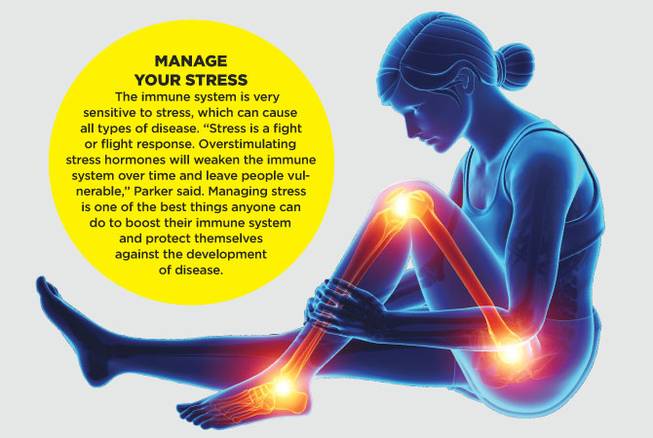
Monday, Sept. 11, 2017 | 2 a.m.
Common, life-threatening, difficult to diagnose and incurable — autoimmune diseases are as mysterious as they are dangerous.
More than 80 different autoimmune diseases have been identified, and the National Institutes of Health (NIH) report that 23.5 million Americans are affected. The American Autoimmune Related Diseases Association (AARDA) estimates that number is closer to 50 million Americans, citing incomplete data contributing to the NIH estimate.
Regardless of the discrepancy, both agencies report that the prevalence of autoimmune disease is rising. “There are so many triggers for autoimmune disease, including stress, diet, lack of exercise, insufficient sleep and smoking. Anything that causes chronic inflammation in the body can eventually lead to the development of an autoimmune disease, which could be one reason they are becoming increasingly common,” said Ryon Parker, MD, Chief Medical Officer at Parker Medical and internal medicine physician at Southern Hills Hospital and Medical Center.
While there is still much to be discovered about autoimmune diseases, managing inflammation and understanding the warning signs can help.
What is an autoimmune disease?
An autoimmune disease describes a condition wherein the patient’s immune system attacks part of their own body.
Usually, a healthy immune system is able to discern the difference between the self and the non-self—attacking only foreign invaders, such as germs. In the case of autoimmune disease, the immune system attacks the body’s own tissues as it would with a harmful virus or bacteria. This causes inflammation in the area targeted and different associated symptoms.
Common autoimmune diseases
• Rheumatoid arthritis: Immune system attacks the joints, causing inflammation, swelling and pain.
• Alopecia areata: Immune system attacks hair follicles, causing hair loss and baldness.
• Type 1 diabetes: Immune system attacks the pancreas and cells that produce insulin.
• Lupus: Immune system attacks various tissues within the body, commonly affecting the joints, lungs, blood cells, nerves and kidneys.
• Multiple sclerosis: Immune system attacks the nerve cells.
• Inflammatory bowel disease (including ulcerative colitis and Crohn’s disease): Immune system attacks the lining of the intestines.
• Psoriasis: Immune system over-produces blood cells that collect in the skin, causing plaque buildup.
• Hashimoto’s disease: Immune system attacks the thyroid gland.
Causes and risk factors
It’s currently unknown what causes autoimmune diseases, but it’s thought to be a combination of genetic factors and environmental influences. “The immune system is so complex, we haven’t even begun to fully understand it,” Parker said.
While many people develop autoimmune disease without any identifiable cause, risk factors include being a woman of childbearing age, having a family history of autoimmune disease, being exposed to certain environmental irritants and being of certain races/ethnic backgrounds.
Symptoms
Because there are so many different autoimmune diseases — all affecting different parts of the body with varying symptomatic consequences — each specific disease comes with its own unique symptoms. However, most autoimmune diseases have a few common traits.
Inflammation: Swelling, pain, redness and heat are all common symptoms of autoimmune disease which tend to be concentrated on the body part(s) affected.
Flare-ups: Many autoimmune diseases get better or worse depending on specific triggers, including stress and diet, causing “flare-ups” in symptoms.
Early/mid-life onset: Most autoimmune diseases appear in a person’s teens through early 30s. Most people aren’t born with an autoimmune disease; the disease develops and adapts over time.
Fatigue: Extreme or chronic fatigue are common symptoms, likely because of the energy exerted by the immune system fighting against the body.
Autoimmune disease and women
The AARDA reports that women account for 75 percent of all patients with autoimmune diseases. While there are no definitive answers to why this may be, it’s speculated that women may have more sophisticated immune responses which contributes to overactivity and/or female sex hormones that may influence inflammation.
Diagnosing autoimmune disease
Autoimmune diseases are notoriously difficult to identify and many patients suffer for years without a medical diagnosis.
“With so many autoimmune conditions out there, it can take a skilled clinician to properly diagnose them. Most can be diagnosed with a blood test looking for the presence of specific antibodies but the doctor has to know which tests to order,” Parker said.
For patients who think they have an undiagnosed autoimmune disease, Parker recommends they ask their doctor about an ANA (antinuclear antibody) test, which can strongly indicate whether it’s an autoimmune disease or something else entirely.
He also suggests patients ask about CRP (c-reactive protein) and/or a ESR (erythrocyte sedimentation rate) test, both of which can detect inflammation within the body.
Take care of your immune system by managing stress
The immune system is very sensitive to stress, which can cause all types of disease. “Stress is a fight or flight response. Overstimulating stress hormones will weaken the immune system over time and leave people vulnerable,” Parker said.
Managing stress is one of the best things anyone can do to boost their immune system and protect themselves against the development of disease.

Join the Discussion:
Check this out for a full explanation of our conversion to the LiveFyre commenting system and instructions on how to sign up for an account.
Full comments policy